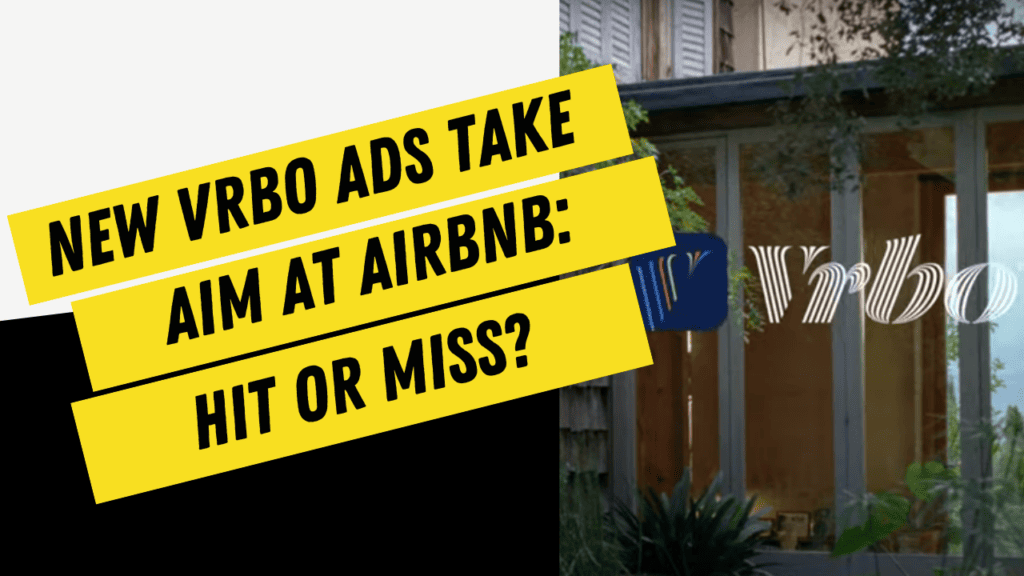Vrbo launched two commercials during the highly coveted pre-game and NFL divisional championship slots. With the advertisements titled “Relax/Rooster” and “Relax/Spaceship,” Vrbo not only aims to strengthen its brand awareness but also critiques its predominant competitor in the short-term rental market, Airbnb.
Vrbo “Relax/Rooster” Commercial
The “Relax/Rooster” commercial begins by presenting viewers with a seemingly picturesque farmstay. As the guests voice their observation, “This looks like an actual farm,” they are met with the reality of rural life—a stark contrast to their expectations. The small trailer designated for their stay is far from ideal, with a pig occupying the bed, an immediate sign that their vacation may not be as relaxing as anticipated.
However, there is a significant shift in ambiance as the commercial transitions to a Vrbo rental. This setting is serene, capacious, and conducive to relaxation, offering a clear juxtaposition to the initial comical disarray. Guests appear engaged in the comforts of their temporary home, enjoying the preparation of a meal together, a hallmark of quality time during a vacation.
Song Used: Harry Hibbs’ “I’se da B’y” accompanies the commercial, its folk melody initially augmenting the rustic setting before viewers are reassured by the narrator’s message endorsing Vrbo’s promise of quality and predictability.
The commercial communicates that while unique and experiential stays can be tempting, the assurance of knowing what to expect from your accommodation is invaluable. Vrbo’s angle here is to underscore reliability and comfort.
“Relax/Spaceship” Commercial
In the “Relax/Spaceship” commercial, the surprise element plays a central role. A trio arrives at a rental boasting a spaceship theme, only to find that the property’s novelty does not translate into practical living space. The cramped quarters, unconventional fixtures, and the lack of separation between common areas bring forth a notion of discomfort rather than the anticipated futuristic adventure.
The narrative swiftly changes as viewers are transported to the contrasting luxury of a spacious Vrbo vacation rental. A man cleanses under a poolside shower, enjoying the expanse and elegance of his surroundings—again emphasizing the disparity between the expectation set by online allure and the reality of personal experience.
Song Used: Laurie Anderson’s “The Night Sky” provides the auditory backdrop, enhancing the avant-garde allure of the spaceship-themed lodging. Nevertheless, Vrbo’s promise of pleasant and spacious accommodations ultimately holds the spotlight.
Here, Vrbo positions itself as a platform where “likes” are secondary to liveable luxury. It brings to the forefront the potential discrepancy between an Instagram-worthy stay and one that genuinely caters to the guests’ needs for space and comfort.
Tagline: “Relax, you booked a Vrbo. Private vacation rentals.”
Vrbo’s Campaign: A Reclamation of ‘Vacation Rentals’
Originally established as a traditional vacation rental platform, Vrbo has long been characterized by its large share of professionally-managed listings and focus on accommodating groups and families in properties that generally offer more space. The ads seem strategically designed to uncouple the term ‘vacation rental’ from being synonymous with Airbnb—a brand closely associated with unique and shareable lodging experiences.
The Subtext of Comparison
By depicting humorous yet unfavorable scenarios where guests are confronted with accommodations far removed from their expectations, the campaign juxtaposes these with serene images of spacious Vrbo offerings. This narrative is aimed to insinuate that while Airbnb may prioritize unique listings that generate social media ‘likes,’ Vrbo offers quality and reliability that truly cater to guest comfort.
The recent spots appear to critique the pursuit of novel experiences over practicality, implying that Airbnb’s unique stays sometimes translate into “horror stories.” Vrbo’s message seems to be: other rental services may disappoint, so choose Vrbo for a guarantee of quality.
But Does The Message Land?
However, while Vrbo’s intent to differentiate itself is apparent, the execution raises questions. The commercials stop short of articulating why Vrbo is the superior choice. For seasoned hosts and property managers, the assurance of quality through professional management and thorough listing vetting might be implicit. Yet, such nuances are not obvious in the commercials themselves.
While criticism is indirectly levied at Airbnb’s catalog of properties, it is well-known within industry circles that there is significant overlap between listings on both platforms. This muddles the waters—what exactly sets Vrbo apart? Are comprehensive checks and guarantees in place for every Vrbo listing?
The Disdain for ‘Likes’
Another point of contention is the apparent disdain for the social sharing of holiday experiences. While the ads scorn rentals ‘just for likes,’ it begs the question: what is intrinsically wrong with seeking photogenic or share-worthy locales? It is a delicate balance to criticize a behavior that is, for many, a natural part of vacation enjoyment.
Execution vs. Intent
As we analyze Vrbo’s campaign, it’s evident that the attempt to communicate a clear value proposition has been overshadowed by an ambiguous message. In previous commercials, Vrbo successfully conveyed the advantage of booking entire homes without host interaction. However, the current campaign’s message about group suitability and space appears diluted and speculative.
Vrbo’s Confrontational Marketing
Vrbo’s strategic direction, as outlined in their “Only Your People” and “A Place for Together” campaigns, emphasizes the exclusivity and privacy of their rental offerings. This focus is further underscored in their “Good Surprises” ad, which portrays the serene experience of a family vacation without the need to share space with hosts or other guests, a clear differentiation from Airbnb’s business model.
These campaigns, co-produced with Wieden+Kennedy, seem to underscore the brand’s unique selling proposition of complete property rentals—a contrast to the shared accommodation alternatives that are sometimes found on Airbnb. Moreover, the company has historically allocated significant resources to advertising, outspending Airbnb by a substantial margin in early 2021, which could suggest a determined effort to cement its position in the market.
The Dilemma of Indirectly Highlighting Airbnb
However, it is essential to consider the implications of an approach that positions a brand largely in opposition to its competitor. The ads’ implicit references to Airbnb may inadvertently drive consumer mindshare towards Vrbo’s competition.
While a competitive stance can be a powerful tool in establishing brand identity and consumer preference, it carries inherent risks. A strategy that appears predominantly adversarial may not constructively communicate the brand’s own strengths but rather frame it within the context of its rival. It is worth noting that consistently associating one’s promotional message with the competition might diminish a brand’s opportunity to establish an independent image in the minds of potential customers.
Lessons from Vrbo: Positioning Your Property to Thrive Independently
This consideration brings to the fore a critical question: Are Vrbo’s advertisements crafting a narrative strong enough to stand on their own merits, or are they relegating the brand to a reactionary role within the narrative established by Airbnb? For short-term rental hosts and property managers, the takeaway is to seek advertising strategies that highlight their unique value propositions in a manner that elevates their brand independently rather than relying on comparisons alone.
Conclusion
In summary, while Vrbo’s commercials are a tactical effort to assert its presence in the vacation rental market, the strategy behind them invites scrutiny. Professional hosts and property managers look for clarity and tangibility in value propositions. Vrbo’s latest marketing effort falls short of providing concrete reasons for choosing its service over others, particularly when many listings are shared with Airbnb. Consequently, the audience is left making assumptions rather than receiving straight answers—and in the competitive climate of short-term rentals, clarity is paramount.
Can Vrbo refine its message to resonate with both customers and industry professionals? Time will tell whether these commercials are merely a blip in the company’s advertising journey or a prelude to a more nuanced and effective marketing strategy.








